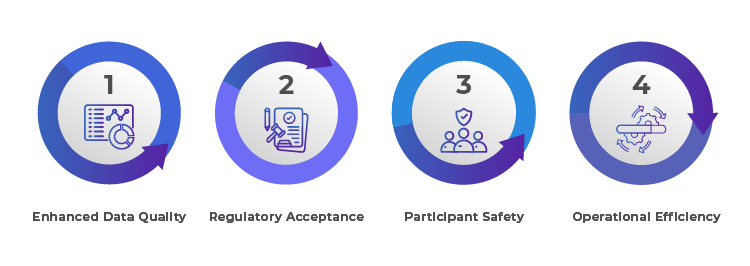
Good Clinical Practice (GCP) guidelines form the basis of ethical and scientific quality standards in clinical trials. While GCP is widely recognized for its role in clinical trials involving human subjects, its principles are equally critical in bioanalytical studies. This blog delves into the impact of GCP on bioanalytical study outcomes and how adherence to these guidelines ensures the reliability, accuracy, and integrity of bioanalytical data.
Understanding Good Clinical Practice (GCP)
GCP encompasses a set of internationally recognized ethical and scientific quality standards for designing, conducting, recording, and reporting clinical trials. These guidelines ensure that the rights, safety, and well-being of trial subjects are protected and that the clinical trial data is credible.
Key Principles of GCP in Bioanalytical Studies
1. Ethical Conduct
Ethical considerations are paramount in any clinical study. GCP mandates that all studies, including bioanalytical ones, are conducted in an ethically sound manner, ensuring respect for participants and the integrity of the research process. This includes obtaining informed consent for the use of biological samples and ensuring confidentiality.
2. Informed Consent
Although bioanalytical studies often deal with biological samples rather than direct human participation, the principles of informed consent still apply. Participants must be informed about the use of their biological samples, and consent must be obtained and documented. Ensuring that participants fully understand how their samples will be used and stored is critical for ethical compliance.
3. Data Integrity and Accuracy
GCP emphasizes the importance of maintaining the integrity and accuracy of data. This includes ensuring that bioanalytical methods are validated, and the data generated is reliable and reproducible. This is achieved through stringent quality control and assurance measures. Regular audits and validation processes are necessary to uphold these standards.
4. Quality Management
Robust quality management systems are essential for ensuring that bioanalytical studies are conducted in compliance with GCP. This includes implementing Standard Operating Procedures (SOPs), regular training, and audits to maintain high standards of quality. Continuous improvement processes and corrective actions are vital components of quality management.
Impact of GCP on Bioanalytical Study Outcomes

Challenges in Implementing GCP in Bioanalytical Studies
1. Complexity of GCP Compliance
GCP compliance involves meticulous documentation, rigorous quality control, and continuous training, which can be resource-intensive. Ensuring all team members are adequately trained and aware of GCP requirements is a continuous challenge.
Remedy:
Training Programs: Implementing comprehensive training programs that cover all aspects of GCP compliance can help ensure that all team members are knowledgeable and capable of maintaining high standards.
2. Evolving Regulations
Keeping up with evolving GCP regulations and guidelines can be challenging for bioanalytical labs, requiring constant updates to processes and training programs. Staying informed about regulatory changes and adapting quickly is essential for compliance.
Remedy:
Regulatory Updates: Developing a system for regularly reviewing and updating regulatory guidelines ensures that the team remains compliant with the latest standards and best practices.
3. Balancing Speed and Quality
Ensuring rapid turnaround times while maintaining high-quality standards is a common challenge in bioanalytical studies. Balancing these priorities requires efficient processes and effective resource management.
Remedy:
Process Optimization: Continuously optimizing processes and leveraging technology can help balance the need for speed and quality in bioanalytical studies, ensuring timely and reliable results.
The impact of Good Clinical Practice (GCP) on bioanalytical study outcomes cannot be overstated. GCP ensures ethical conduct, data integrity, and regulatory acceptance of bioanalytical studies, ultimately leading to more reliable and impactful research outcomes.
At Freyr, we are committed to supporting your bioanalytical studies with our comprehensive regulatory services, ensuring GCP compliance and enhancing the quality and reliability of your research data. Partner with Freyr to navigate the complexities of GCP and achieve excellence in your bioanalytical studies.









